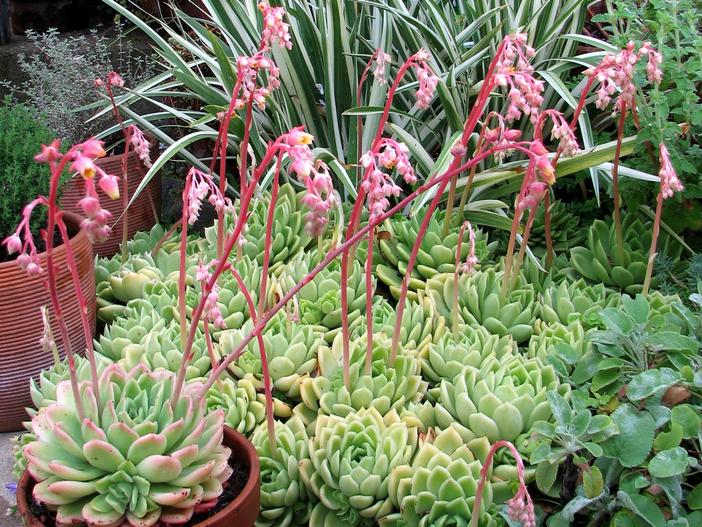Wax Agave
(Echeveria agavoides)
Wax Agave (Echeveria agavoides)
/
/

Seán A. O’Hara
CC BY 2.0
Image By:
Seán A. O’Hara
Recorded By:
Copyright:
CC BY 2.0
Copyright Notice:
Photo by: Seán A. O’Hara | License Type: CC BY 2.0 | License URL: https://creativecommons.org/licenses/by/2.0/ | Uploader: hortulus | Publisher: Flickr

























Estimated Native Range
Summary
Echeveria agavoides, commonly known as Wax Agave, is an evergreen succulent native to rocky outcrops in semi-desert regions of Central Mexico. It typically grows to 8–12 centimeters (3.1–4.7 inches) tall, with a rosette of leaves 7–15 centimeters (2.8–5.9 inches) in diameter. Mature plants may produce offsets, leading to a clumping habit. The leaves are green, triangular, and resemble those of an agave, which is reflected in the species name ’agavoides’. They are notably thick (6 mm) and pointed. Some varieties exhibit reddish or bronze tips, and others have red to very red margins, especially when exposed to bright light. During the summer, Echeveria agavoides produces slender, single-sided cymes up to 50 centimeters (20 inches) long, with showy flowers that are pink, orange, or red with dark yellow-tipped petals.
This succulent is valued for its architectural form and the color it brings to rock gardens, container displays, and as a ground cover in xeriscapes. It is also popular as an indoor plant due to its low water needs and attractive appearance. Echeveria agavoides requires minimal maintenance, making it an excellent choice for gardeners of all levels. It thrives in full sun to part shade, in well-draining, mineral-rich soils, and is drought-tolerant once established. During winter, it needs a rest period with little to no water and cool temperatures above 5 °C (41 °F). Propagation is straightforward through leaf cuttings or division. However, it is susceptible to root rot if overwatered and may suffer from mealybugs and aphids.CC BY-SA 4.0
This succulent is valued for its architectural form and the color it brings to rock gardens, container displays, and as a ground cover in xeriscapes. It is also popular as an indoor plant due to its low water needs and attractive appearance. Echeveria agavoides requires minimal maintenance, making it an excellent choice for gardeners of all levels. It thrives in full sun to part shade, in well-draining, mineral-rich soils, and is drought-tolerant once established. During winter, it needs a rest period with little to no water and cool temperatures above 5 °C (41 °F). Propagation is straightforward through leaf cuttings or division. However, it is susceptible to root rot if overwatered and may suffer from mealybugs and aphids.CC BY-SA 4.0
Plant Description
- Plant Type: Succulent
- Height: 0.5-1 feet
- Width: 0.5-1 feet
- Growth Rate: Moderate
- Flower Color: Red, Yellow
- Flowering Season: Spring
- Leaf Retention: Evergreen
Growth Requirements
- Sun: Full Sun, Part Shade
- Water: Very Low
- Drainage: Fast
Common Uses
Border Plant, Deer Resistant, Drought Tolerant, Fire Resistant, Groundcover, Low Maintenance, Potted Plant, Rock Garden, Showy Flowers, Street Planting
Natural Habitat
Rocky outcrops in semi-desert regions of Central Mexico
Other Names
Common Names: Lipstick Echeveria , Wax Echeveria , Crested Molded Wax Agave , Molded Wax Plant
Scientific Names: Echeveria agavoides , Echeveria agavoides var. corderoyi , Echeveria agavoides var. multifida , Echeveria agavoides var. prolifera , Urbinia agavoides , Urbinia obscura , Echeveria corderoyi , Cotyledon agavoides , Urbinia corderoyi , Cotyledon corderoyi
GBIF Accepted Name: Echeveria agavoides Lem.